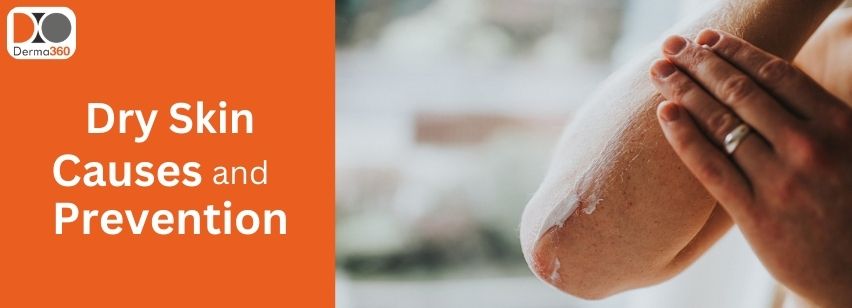Nurturing Your Skin: Exploring the Causes and Preventions for Dry Skin
Your skin, the body’s largest organ, is a reflection of overall health and vitality. When it comes to skin wellness, dryness is a common concern that can affect both look and comfort. This blog explores the causes of dry skin and offers insights into effective prevention strategies, allowing you to nurture your skin’s health and radiance.
Understanding Dry Skin:
Dry skin, medically known as xerosis, occurs when the skin lacks the necessary moisture to keep it smooth and supple. While it can affect anyone, certain factors may increase the likelihood of developing dry skin.

Common Causes of Dry Skin:
Weather Conditions: Harsh environmental elements, such as cold and dry air, can strip the skin of its natural oils, leading to dryness. Similarly, exposure to excessive sunlight can contribute to dehydration and dry skin.
Hot Showers and Baths: While a hot shower or bath may be soothing, but long exposure to hot water can strip the skin of its natural oils, causing dryness. Opting for lukewarm water and shorter bathing times can help reduce this effect.
Harsh Soaps and Cleansers: Certain soaps and cleansers contain harsh chemicals that can disrupt the skin’s natural barrier function. Choosing mild, fragrance-free products can be gentler on the skin and reduce the risk of dryness.
Age: As the skin ages, it tends to produce fewer natural oils, making it more prone to dryness. Aging also affects the skin’s ability to retain moisture, contributing to a drier complexion.
Medical Conditions: Certain medical conditions, such as eczema, psoriasis, and thyroid disorders, can manifest as dry skin. Addressing the underlying health issue is crucial for managing dryness in these cases.
Effective Strategies for Dry Skin Prevention:
Hydration from Within: Adequate hydration is important for skin health. Ensure you are drinking enough water throughout the day to keep your body and skin well-hydrated.
Moisturize Regularly: Using a good-quality moisturizer helps lock in moisture and prevents water loss from the skin. Choose a product that suits your skin type and apply it consistently, especially after bathing.
Humidify Your Environment: In dry climates or during winter months when indoor heating systems are in use, consider using a humidifier. Adding moisture to the air can help prevent environmental dryness.
Gentle Cleansing Practices: Opt for mild, fragrance-free cleansers that won’t strip the skin of its natural oils. Avoid hot water and limit bathing time to prevent excessive drying.
Protect Your Skin: In harsh weather conditions, protect your skin by wearing appropriate clothing, such as gloves and scarves. Use sunscreen to shield your skin from the harmful effects of UV rays.
Including Skincare in Your Daily Routine:
Regular Exfoliation: Exfoliating helps remove dead skin cells, allowing moisturizers to penetrate more effectively. However, moderation is key to preventing irritation.
Nutrient-Rich Diet: Consuming a balanced diet rich in vitamins and minerals supports overall skin health. Essential fatty acids, found in foods like salmon and avocados, can contribute to skin hydration.
Consulting a Dermatologist: If dryness persists despite self-care efforts, consulting a dermatologist is advisable. They can identify underlying causes and recommend specialized treatments or prescription skincare products.
A Radiant Path to Healthy Skin
Understanding the causes of dry skin empowers you to make informed choices for its prevention. You may take care of the health of your skin and reveal a glowing complexion by implementing an effective skincare routine that incorporates effective skincare products, proper hydration, and lifestyle modifications. Adopt these strategies to create a skincare routine that not only addresses dryness but also promotes the overall well-being of your skin.




